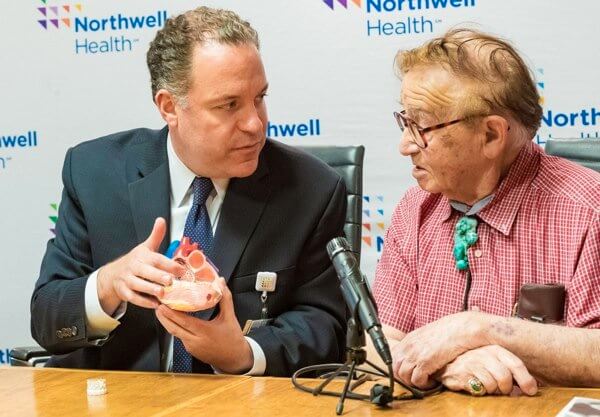By Steven Goodstein
One Holocaust survivor just might be immortal.
Jack Betteil, a 95-year old Bayside resident, Holocaust survivor and former North Shore University Hospital patient returned last week to the hospital that helped save his life exactly three months after undergoing a heart procedure to replace his aortic valve and prolong his life.
Betteil was born in 1923 in Krakow, Poland, and survived internment at six different concentration camps before he was freed in May 1945. During this time, his grandparents and younger sister were murdered.
At the time of his release, Betteil weighed only 70 pounds. He eventually immigrated to the United States and pursued a career in fixing broken television sets. Betteil first settled in Forest Hills with his new wife before moving to Bayside in 1960. The couple wanted their children to grow up in a house with a front lawn located in a beautiful neighborhood.
In November, Bettiel was suffering from a severe case of aortic stenosis, a condition affecting the aortic valve, which is one of four heart valves.
In stenosis, the aortic valve becomes calcified — or hardened — over time, resulting in severe breathing difficulty. Breathing felt nearly impossible for Betteil, who was also unable to walk up and down the stairs in his two-level home.
On April 18, Betteil successfully underwent the TAVR procedure at North Shore University Hospital in Manhasset. Three months later on July 19, he came back to express his gratitude to his doctor and the hospital for immeasurably improving his condition.
“My doctor is a miracle worker,” proclaimed Betteil, who said that he no longer experiences feelings of breathlessness, chest pressure or shortness of breath. “In contrast to the Holocaust, in contrast to my health conditions six months ago, this is paradise.”
Betteil added that he is looking forward to returning to his life’s passion of creating wood carvings of Native American face masks, oil paintings and statues, which depict the stories of the first Americans’ history.
“Before this technology, the only way to address a severely narrow aortic valve was to perform open-heart surgery and replace the damaged valve with a new one,” said his cardiac physician, Dr. Bruce Rutkin, who is also the director of Structural Heart Disease at North Shore.
“He was a good candidate for the (TAVR) procedure,” Rutkin said. “Obviously, the other procedure would be too difficult to perform for a man of (Mr. Betteil’s) age.”
TAVR, or the Transcatheter Aortic Valve Replacement, is a procedure described by Rutkin as a minimally invasive technique to replace a narrowed valve without making an incision in the patient’s chest.
“My father, who had such a zest for life, was having great difficulty breathing even during the smallest activities,” said Betteil’s son, Matthew. “My family is so grateful that the doctors at this hospital did everything they could to preserve his life.”
Matthew added that he believes his father’s fascination with Native American-related artwork stems from Betteil’s empathy toward Native Americans and their story.
Reach Steven Goodstein by e-mail at sgood



































